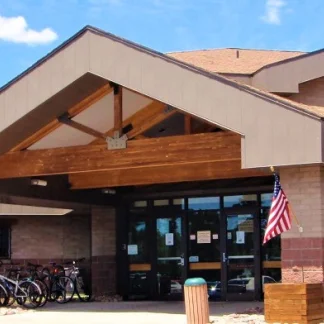Flagstaff Medical Center - Behavioral Health
Flagstaff Medical Center - Behavioral Health, located in Flagstaff, Arizona, off...
The Guidance Center – North Vickey Street is a drug and alcohol rehab in Flagstaff, Arizona. This facility offers inpatient addiction treatment, outpatient treatment, and psychiatric care for children, adults, and families.
A residential program using evidence-based treatment is available for adults aged 18 and older. Treatment consists of daily structured programming with case management, individual and group therapy, medication management, psychoeducation sessions, recreational activities, AA meetings, and Acceptance and Commitment Therapy.
The outpatient program uses the matrix model and group therapy to address substance use disorder. Care management coordinates clients’ medication management. Other therapy approaches used in this program include WRAP, meditation, art therapy, DBT, exercise, and skills groups. Sessions are offered in the evenings.
Contact us for more information: (928) 527-1899

Connect with The Guidance Center - North Vickey Street by calling their admissions team directly.
(928) 527-1899 Website Get DirectionsResearch clearly demonstrates that recovery is far more successful and sustainable when loved ones like family members participate in rehab and substance abuse treatment. Genetic factors may be at play when it comes to drug and alcohol addiction, as well as mental health issues. Family dynamics often play a critical role in addiction triggers, and if properly educated, family members can be a strong source of support when it comes to rehabilitation.
Group therapy is any therapeutic work that happens in a group (not one-on-one). There are a number of different group therapy modalities, including support groups, experiential therapy, psycho-education, and more. Group therapy involves treatment as well as processing interaction between group members.
Trauma therapy addresses traumatic incidents from a client's past that are likely affecting their present-day experience. Trauma is often one of the primary triggers and potential causes of addiction, and can stem from child sexual abuse, domestic violence, having a parent with a mental illness, losing one or both parents at a young age, teenage or adult sexual assault, or any number of other factors. The purpose of trauma therapy is to allow a patient to process trauma and move through and past it, with the help of trained and compassionate mental health professionals.
Group therapy is any therapeutic work that happens in a group (not one-on-one). There are a number of different group therapy modalities, including support groups, experiential therapy, psycho-education, and more. Group therapy involves treatment as well as processing interaction between group members.
Trauma therapy addresses traumatic incidents from a client's past that are likely affecting their present-day experience. Trauma is often one of the primary triggers and potential causes of addiction, and can stem from child sexual abuse, domestic violence, having a parent with a mental illness, losing one or both parents at a young age, teenage or adult sexual assault, or any number of other factors. The purpose of trauma therapy is to allow a patient to process trauma and move through and past it, with the help of trained and compassionate mental health professionals.
Trauma therapy addresses traumatic incidents from a client's past that are likely affecting their present-day experience. Trauma is often one of the primary triggers and potential causes of addiction, and can stem from child sexual abuse, domestic violence, having a parent with a mental illness, losing one or both parents at a young age, teenage or adult sexual assault, or any number of other factors. The purpose of trauma therapy is to allow a patient to process trauma and move through and past it, with the help of trained and compassionate mental health professionals.
Flagstaff Medical Center - Behavioral Health, located in Flagstaff, Arizona, off...
Southwest Behavioral Health Services – Flagstaff Outpatient is a drug and alcoho...
Back2Basics Outdoor Adventure Therapy is a drug and alcohol rehab in Flagstaff, ...
The Guidance Center – East Industrial Drive is a drug and alcohol rehab in Flags...